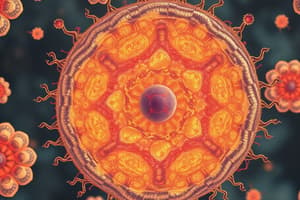Podcast
Questions and Answers
What is the function of the endoplasmic reticulum in a cell?
What is the function of the endoplasmic reticulum in a cell?
- Cellular movement facilitation
- Provide a surface for biochemical activities (correct)
- Storage of genetic material
- Energy production
Which organelle is responsible for the transport of materials, especially proteins, within the cell?
Which organelle is responsible for the transport of materials, especially proteins, within the cell?
- Plastids
- Lysosomes
- Golgi apparatus (correct)
- Mitochondria
What distinguishes eukaryotic cells from prokaryotic cells?
What distinguishes eukaryotic cells from prokaryotic cells?
- Smaller size
- Lack of membrane-bound organelles
- Presence of a nucleus (correct)
- Absence of genetic material
Which organelle is responsible for intracellular digestion and waste removal?
Which organelle is responsible for intracellular digestion and waste removal?
What is a major function of the mitochondria in a cell?
What is a major function of the mitochondria in a cell?
Which cell organelle is important for processing, packaging, and secreting proteins in the cell?
Which cell organelle is important for processing, packaging, and secreting proteins in the cell?
What distinguishes eukaryotic cells from prokaryotic cells in terms of organelles?
What distinguishes eukaryotic cells from prokaryotic cells in terms of organelles?
What is the primary function of plastids in a cell?
What is the primary function of plastids in a cell?
Explain the difference between skeletal muscles and smooth muscles in terms of their structure and function.
Explain the difference between skeletal muscles and smooth muscles in terms of their structure and function.
Describe the unique features of cardiac muscles and explain why they are different from skeletal and smooth muscles.
Describe the unique features of cardiac muscles and explain why they are different from skeletal and smooth muscles.
How does the structure of muscular tissues differ from other tissues in the human body?
How does the structure of muscular tissues differ from other tissues in the human body?
Explain the concept of involuntary movements and provide examples of muscular tissues involved in such movements.
Explain the concept of involuntary movements and provide examples of muscular tissues involved in such movements.
How does meristematic tissue play a role in the growth of plant roots?
How does meristematic tissue play a role in the growth of plant roots?
Discuss the significance of apical meristem in plant growth and development.
Discuss the significance of apical meristem in plant growth and development.
What is the role of intercalary meristem in plant tissues, and where is it typically located?
What is the role of intercalary meristem in plant tissues, and where is it typically located?
Explain why the growth of roots in onions stops when the tips are cut in jar 2.
Explain why the growth of roots in onions stops when the tips are cut in jar 2.
Why is the presence of meristematic tissues important for the growth of plants?
Why is the presence of meristematic tissues important for the growth of plants?
How do differentiated cells in plants originate from meristematic tissues, and what changes occur during this process?
How do differentiated cells in plants originate from meristematic tissues, and what changes occur during this process?
Flashcards are hidden until you start studying




